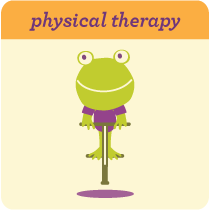 Gross Motor SkillsCore StrengtheningGait TrainingBalanceEndurance / AgilityOrthopedic ConcernsPlagiocephaly and TorticollisFitness Fundamentals / ExergamingConsultations
Gross Motor SkillsCore StrengtheningGait TrainingBalanceEndurance / AgilityOrthopedic ConcernsPlagiocephaly and TorticollisFitness Fundamentals / ExergamingConsultations
.jpg) A child uses gross motor skills to develop and explore their surroundings as babies and to engage not only in daily activities but in things we so often associate with childhood: jumping, balancing, riding a bike or playing ball. But perhaps your child is content with being in one position, not interested in, or maybe having difficulties participating in, sports and outdoor play; they may tire easily or appear clumsy or awkward in approaching things like playground equipment, balls, and uneven surfaces; or they may just appear to have overall body awkwardness. In fact, your child may have been recommended for a physical therapy evaluation and treatment by your pediatrician, teacher or activity leader. Those professionals may feel that your child does not appear to be as skillful as same age peers in large movement activities, or may be avoiding these activities altogether.
A child uses gross motor skills to develop and explore their surroundings as babies and to engage not only in daily activities but in things we so often associate with childhood: jumping, balancing, riding a bike or playing ball. But perhaps your child is content with being in one position, not interested in, or maybe having difficulties participating in, sports and outdoor play; they may tire easily or appear clumsy or awkward in approaching things like playground equipment, balls, and uneven surfaces; or they may just appear to have overall body awkwardness. In fact, your child may have been recommended for a physical therapy evaluation and treatment by your pediatrician, teacher or activity leader. Those professionals may feel that your child does not appear to be as skillful as same age peers in large movement activities, or may be avoiding these activities altogether.
Pediatric physical (and occupational) therapists have a unique understanding of how body scheme and internal body map can be out of sync. When this occurs, a child may have a problem with motor planning (dyspraxia). Your child, who may have normal motor strength and agility, may still have difficulty approaching new motor sequences. For example, they may be able to kick a ball, but not be able to use that skill in a game. Or, they may have the strength to ride a bike, but somehow cannot seem to make their body pedal the wheels. Children with motor planning difficulties are reluctant to participant in sports programs, as they do not automatically understand how to initiate, duplicate and expand the skills necessary to participate in specific activities.
Pediatric Potentials physical therapists have a full understanding of developmentally appropriate gross motor skills, motor planning abilities and musculoskeletal/nervous system development. In order to determine what is interfering with your child’s gross motor skills acquisition and what treatment your child might benefit from, Pediatric Potentials highly skilled therapists will evaluate your child using an age appropriate developmental approach. Depending on your child’s age and development you may consider such an evaluation if you see you child:
If these “red flag” issues are getting in the way of your child’s enjoyment or progress in typical settings, we need to address them.

SN Pediatric Potentials, Inc.  154 S. Livingston Ave, Suite 204
154 S. Livingston Ave, Suite 204  Livingston, NJ 07039
Livingston, NJ 07039
 973.535.5010
973.535.5010
 director@pediatricpotentialsnj.com
director@pediatricpotentialsnj.com
Site designed by Jillian Kornsweig



